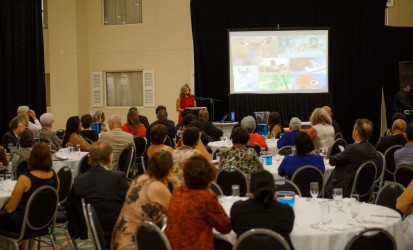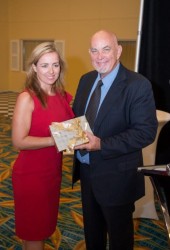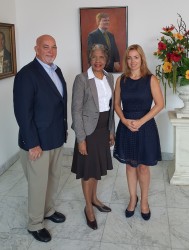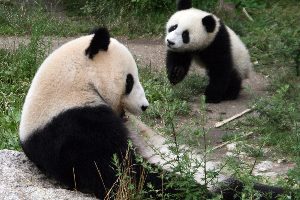Worldlog novembre 2015
Durante le vacanze sono stata nei Caraibi dal 22 al 27 ottobre. Ero stata invitata dall’associazione Tutela degli animali su Curacao. Durante una cena organizzata da loro ho fatto una relazione sul rapporto storto tra l’uomo e l’animale.



Presentazione / Con Gregory Berry, presidente dell’associazione Tutela degli animali Curacao / Parlando con la governatrice, signora George-Wout
Ho anche parlato con molte organizzazioni per tutelare gli animali e la natura, ad esempio Friends of the Earth, Curaçao Animal Rights Foundation e DCNA (Dutch Caribean Nature Alliance). Con Friends of the Earth ho parlato sull’impianto di petrolio presente sull’isola gestita dall’azienda Isla (prima era di Shell) e iL suo impatto sulla salute del popolo. Shell non ha ancora assunto nessuna responsabilita’ per i danni che l’impianto ha causato negli anni.
Ho anche visitato il canile a Willemstad. E’ a rischio il suo finanzamento e quindi la continuita’ del canile e sarebbe un disastro per i tanti cani ma anche gatti che tengono. Parlando con la governatrice, signora George-Wout, ho discusso questa problematica. Lei era positiva sull’idea di mettere su una clinica mobile per gli animali per poter sterilizzare o castrare i cani nei vari quartieri.
A Bonaire ho parlato anche con gente di Wild Donkeys (asini selvagi) e la Donkey Sanctuary (sanctuario degli asini) per capire meglio la situazione degli asini che vivono qui da quando sono stati importati dagli spagnoli nel sedicesimo secolo. Ho fatto varie domande alla Camera sulla situazione degli asini su Bonaire. La gente che si occupa della tutela degli animali e’ divisa sulla maniera giusta di gestire la situazione e mi sono informata bene tramite varie organizzazioni. Sembrano essere d’accordo su due argomenti: gli asini devono di nuovo avere accesso alle risorse di acqua (che al momento sono inaccessibili) e gli animali devono essere protetti meglio contro il traffico sull’isola.
Panda cinesi
 Dopo le vacanze ho subito fatto delle domande alla Camera indirizzate al nostro presidente e al ministro di Affari Esteri per il discorso delle pande cinesi. I Paesi Bassi hanno ricevuto in prestito due pande dalla Cina, come parte di un accordo di affari tra i Paesi Bassi e la Cina. Lo scambio di questi animali vulnerabili e rari per poi metterli in mostra in uno zoo olandese, e’ da altri tempi e non dovrebbe assolutamente fare parte di un accordo di affari con un paese che danneggia i diritti umani e degli animali oggi. La Cina ‘presta’ le pande ai paesi con quali vogliono avere un rapporto piu’ stretto. Sarebbe meglio se il nostro governo desse la priorita’ ai diritti umani e il benessere degli animali invece che al commercio. Inoltre trovo che un presidente e un ministro di Affari Esteri debbano impegnarsi di cose piu’ importanti che ottenere delle pande per il guadagno finanziario di uno zoo.
Dopo le vacanze ho subito fatto delle domande alla Camera indirizzate al nostro presidente e al ministro di Affari Esteri per il discorso delle pande cinesi. I Paesi Bassi hanno ricevuto in prestito due pande dalla Cina, come parte di un accordo di affari tra i Paesi Bassi e la Cina. Lo scambio di questi animali vulnerabili e rari per poi metterli in mostra in uno zoo olandese, e’ da altri tempi e non dovrebbe assolutamente fare parte di un accordo di affari con un paese che danneggia i diritti umani e degli animali oggi. La Cina ‘presta’ le pande ai paesi con quali vogliono avere un rapporto piu’ stretto. Sarebbe meglio se il nostro governo desse la priorita’ ai diritti umani e il benessere degli animali invece che al commercio. Inoltre trovo che un presidente e un ministro di Affari Esteri debbano impegnarsi di cose piu’ importanti che ottenere delle pande per il guadagno finanziario di uno zoo.
La settimana scorsa la OMS ha aggiunto all’elenco di sostanze carcinogeniche la carne elaborata come la pancetta, il prosciutto, l’hot dog ed hamburger. Fa vedere ancora che e’ saggio mangiare meno carne non solo per l’ambiente, ma anche per la propria salute!
Infine vi aggiorno volentieri anche su questa novita’ su una squadra di calcio brittanica che da ai suoi fan esclusivamente degli snack vegani.
Alla prossima volta!
Cordiali saluti,
Marianne
At the invitation of the Curacao Society for the Protection of Animals, I have travelled to the Caribbean during the autumn recess from 22 to 27 October. They had organised a charity gala dinner where I discussed the troubled relationship between man and animal.
I took this opportunity to point out the considerable improvements yet to be made by the Curacao government in order to become more animal-friendly. After all, in addition to its massive stray animal issue, Curacao only sells battery cage-eggs, and items such as the consumption of meat, hunting, animal testing and the suffering of many purebred dogs that are bred solely for their external traits are not high on the political agenda. Many of the attending guests approached me after my speech to exchange thoughts. It has been an inspiring evening on which I have met many friendly and enthusiastic animal protectionists.



Presentation / With Gregory Berry, chairman of the Curacao Animal Rights Foundation / Meeting with the Governor, Mrs. George-Wout
I have had many discussions with various animal welfare and environmental organisations, including Friends of the Earth, Curacao Animal Rights Foundation and DCNA (Dutch Caribbean Nature Alliance). An important subject of debate with Friends of the Earth was the Isla oil refinery (formerly known as Shell) located on the island, and its impact on the environment and public health. Shell has still not taken any responsibility with regard to the damage caused by the refinery for years on end.
Furthermore, I have visited the animal shelter in Willemstad. The financing as well as the continued existence of this much-needed animal shelter are at risk, which could prove a disaster for the many cats and dogs that receive shelter here. I have discussed this problem with the shelter’s Governor Mrs George-Wout. She was very positive about the idea of setting up a mobile animal clinic with the purpose of neutering dogs in the different districts.
On Bonaire, I have spoken to people from Wild Donkeys and Donkey Sanctuary in order to deepen my knowledge on-site of the situation of the donkeys living there ever since the Spanish brought them to the island in the 16th century. On several occasions, I have put forward Parliamentary questions about the situation of these donkeys. Different animal protectionists hold rather different views on the best possible approach and I have made thorough inquires about it with several organisations. They do seem to be in agreement about two things: the donkeys should regain access to old, currently closed springs, and the animals should be better protected from traffic on the island.
Chinese panda’s
 As soon as the autumn recess was over, I put forward my Parliamentary questions regarding the Chinese pandas to our Prime Minister and our Minister for Foreign Affairs. It so happens that the Netherlands was given two pandas by the Chinese government as a “present”, or rather they were lent to us as a result of a trade mission between China and the Netherlands. Exchanging fragile and rare animals and then displaying them in a Dutch zoo is truly outdated and should certainly not be part of a trade mission with a country where human and animal rights are violated on a large scale. China “lends” pandas to countries with which they want to form a closer relationship. It would be to the credit of our government if it would choose human rights and animal welfare over trade. Furthermore, I believe that a prime minister and a minister for Foreign Affairs should concern themselves with matters that are more important than obtaining pandas for a zoo’s commercial gain.
As soon as the autumn recess was over, I put forward my Parliamentary questions regarding the Chinese pandas to our Prime Minister and our Minister for Foreign Affairs. It so happens that the Netherlands was given two pandas by the Chinese government as a “present”, or rather they were lent to us as a result of a trade mission between China and the Netherlands. Exchanging fragile and rare animals and then displaying them in a Dutch zoo is truly outdated and should certainly not be part of a trade mission with a country where human and animal rights are violated on a large scale. China “lends” pandas to countries with which they want to form a closer relationship. It would be to the credit of our government if it would choose human rights and animal welfare over trade. Furthermore, I believe that a prime minister and a minister for Foreign Affairs should concern themselves with matters that are more important than obtaining pandas for a zoo’s commercial gain.
Last week, the World Health Organisation has added processed meats such as bacon, ham, hot dogs and hamburgers to the list of carcinogens . Once again, this demonstrates that consuming less meat not only benefits animal and environment, but our own health as well.
To conclude, I would like to share with you this fun news item about a British football club that serves its fans strictly vegan snacks.
Until next time!
Marianne